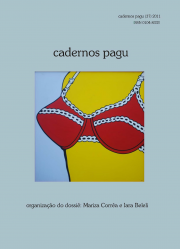Resumo
El 28 de agosto del año 2003, tras dos años de trabajo y habiendo recopilado unos 17000 testimonios, la Comisión de la Verdad y Reconciliación del Perú presentó su Informe Final sobre el periodo de violencia 1980-2000. Esta comisión compartió numerosos rasgos con las comisiones guatemalteca y sudafricana que la antecedieron. Las tres comisiones fueron consideradas sensibles al género puesto que buscaron activamente sacar a la luz las experiencias de violencia sufridas por mujeres. Este énfasis reflejó el deseo de escribir ―verdades más inclusivas‖, así como también los cambios en la jurisprudencia internacional. En este artículo examino las estrategias de investigación sensibles al género y los modos en los cuales las comisiones de verdad han incorporado estas estrategias en su trabajo. La verdad y memoria se encuentran, de hecho, atravesadas por el género, pero no necesariamente del modo en que lo entiende el sentido común. Así, espero ofrecer una comprensión más sutil de las dimensiones asociadas al género presentes en la guerra.
Abstract
In August 28, 2003, after two years working and having collected 17000 testimonials, the Peruvian Committee for the Truth and Reconciliation presented its Final Information on the violence period from 1980 to 2000. This Committee shared many traits with its equivalents from Guatemala and South Africa. All three Committees were considered gender-sensitive for they tried to bring to light the experiences of violence suffered by women. Such an emphasis reflected the will to write ―more inclusive truths‖ as well as changes in international jurisprudence. In this article, I examine the gender-sensitive research strategies and the ways in which truth committees incorporated these strategies to their work. Truth and memory are, in fact, crossed by gender, but not necessarily in the way that common sense understands it. Thus, I hope to offer a more subtle understanding of the dimensions associated to gender in war.
Key Words: Commissions for the Truth, Reconciliation, gender, memory, Peru
Referências
COCKBURN, Cynthia. The Gendered Dynamics of Armed Conflict and Political Violence. In: MOSER, Caroline O. N. e CLARK, Fiona C. (eds.) Victims, Perpetrators or Actors? Gender, Armed Conflict and Political Violence. London: Zed Books, 2001.
CONNELL, Patricia. Understanding Victimization and Agency: Considerations of Race, Class and Gender" Political and Legal Anthropology Review 20(2), 1997, pp.116-143.
DAS, Veena e KLEINMAN, Arthur. Introduction. In: DAS, Veena; KLEINMAN, Arthur; LOCK, Margaret; RAMPHELE, Mamphela; e REYNOLDS, Pamela.
(eds.) Remaking a World: Violence, Social Suffering and Recovery.
Berkeley, University of California Press, 2001.
ENLOE, Cynthia. Does Khaki Become You? The Militarisation of Women‟s Lives. London, Pandora Press, 1988.
GEERTZ, Clifford. Local Knowledge: Further Essays in Interpretive Anthropology. New York, Basic Books, 1983.
HATZFELD, Jean. Machete Season: The Killers in Rwanda Speak. New York, Farrar, Straus, e Giroux, 2005.
HAYNER, Priscilla B. Unspeakable Truths: Confronting State Terror and Atrocity. London and New York, Routledge, 2001.
JELIN, Elizabeth. Los trabajos de la memoria. Madrid, Siglo XXI, 2002.
KELLY, Liz. Wars Against Women: Sexual Violence, Sexual Politics and the Militarised State. In: Jacobs, Susie; Jacobson, Ruth e Marchbank, Jennifer. (eds.) States of Conflict: Gender, Violence and Resistance, New York, St. Martin‘s Press, 2000.
KIRK, Robin. Grabada en piedra: Las Mujeres de Sendero Luminoso.
Lima, Instituto de Estudios Peruanos, 1993.
KROG, Antje. Locked into Loss and Silence: Testimonies of Gender and Violence at the South African Truth Commission. In: Moser, Caroline O. N. e Clark, Fiona C. (eds.) Victims, Perpetrators or Actors? Gender, Armed Conflict and Political Violence. London, Zed Books, 2001 MANTILLA, Falcón. The Peruvian Truth and Reconciliation Commission‘s Treatment of Sexual Violence Against Women. Human Rights Brief, vol. 12, Issue 2, 2005a, pp.1-5.
__________. La experiencia de la Comisón de la Verdad y Reconciliación en el Perú: Logros y dificultades de un enfoque de género. In: Memorias de Ocupación: Violencia sexual contra mujeres detenidas durante la dictadura. Chile, Centro Regional de Derechos Humanos y Justicia de Género, 2005b.
MINOW, Martha. Between Vengeance and Forgiveness: Facing History after Genocide and Mass Violence. Boston, Beacon Press, 1998.
REHN, Elisabeth e SIRLEAF, Ellen Johnson. Women, War and Peace: The Independent Expert‟s Assessment on the Impact of Armed Conflict on Women and Women‟s Roles in Peace-building. New York, UNIFEM, 2002.
ROSS, Fiona. Bearing Witness: Women and the Truth and Reconciliation Commission in South Africa. London, Pluto Press, 2002.
SCARRY, Elaine. The Body in Pain: The Making and Unmaking of the World. New York, Oxford University Press, 1985.
THEIDON, Kimberly. Disarming the Subject: Remembering War and Imagining Citizenship in Peru. Cultural Critique, nº 54, 2003, pp.67- 87.
INSTITUTO DE ESTUDIOS PERUANOS. Entre Prójimos: El conflicto armado interno y la política de la reconciliación en el Perú. Lima, Perú, 2004.
TRUTH AND RECONCILIATION COMMISSION. Final Report. Lima, Peru, 2003.
UTAS, Mats. Victimcy, Girlfriending, Soldiering: Tactic Agency in a Young Woman's Social Navigation of the Liberian War Zone.
Anthropological Quarterly 78(2), 2005, pp.403-430.

